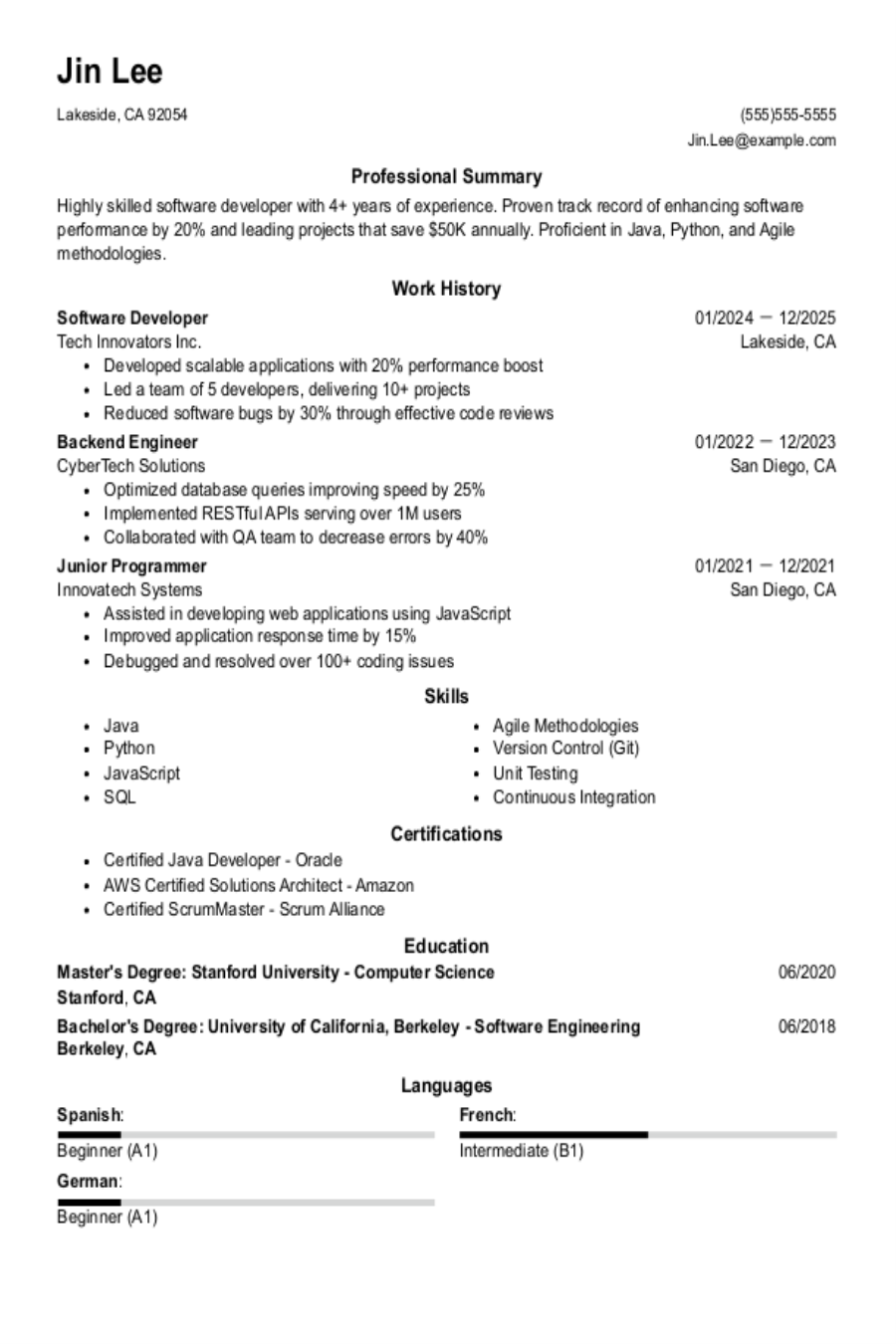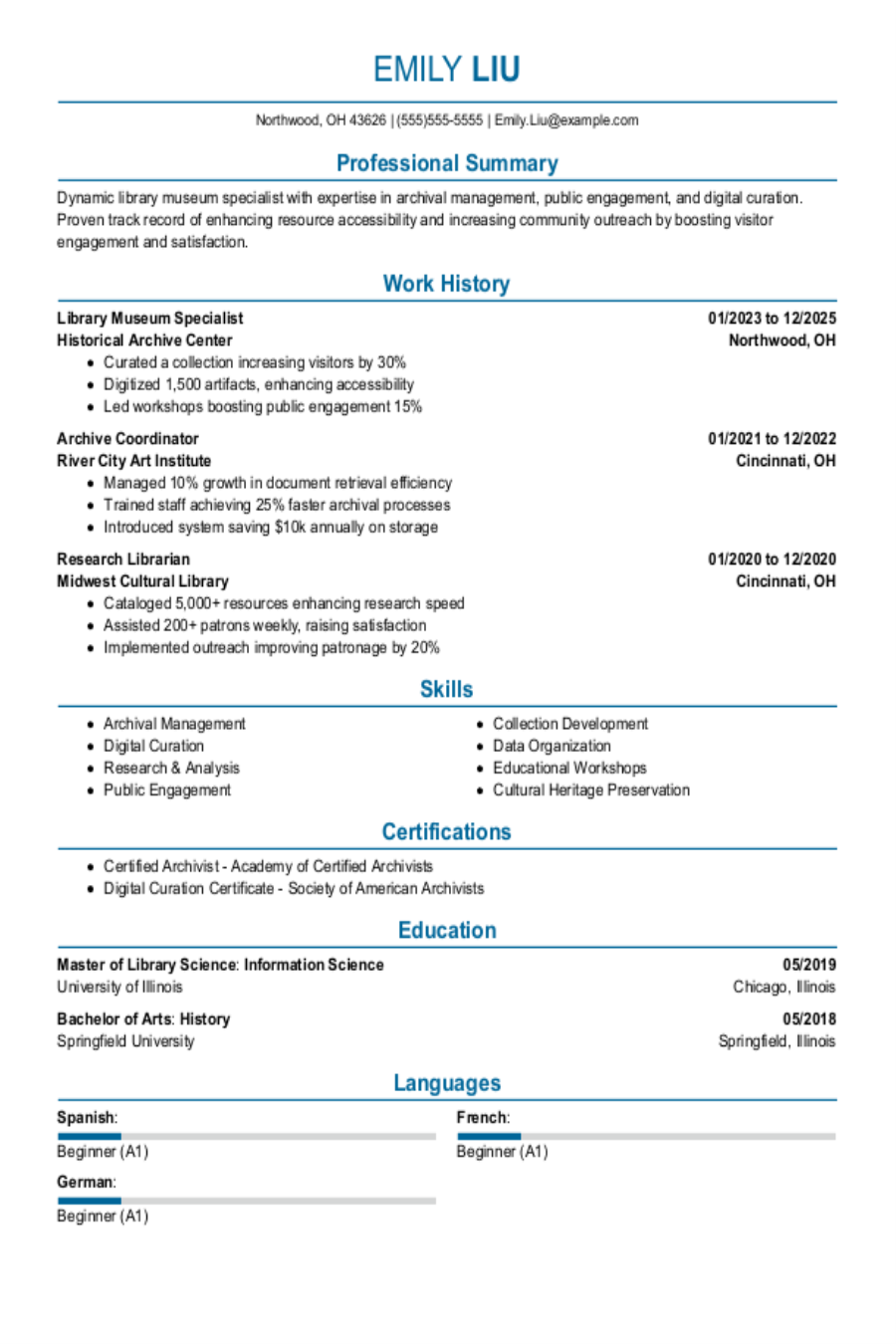Popular Data Analyst Resume Examples
Entry-level data analyst resume
An entry-level resume for a data analyst should highlight relevant coursework, internships, technical skills in data analysis tools, and strong problem-solving abilities to show analytical potential.
Prioritizes readability: A clean, straightforward simple resume template improves the clarity of this candidate's qualifications. By simplifying the layout, recruiters can quickly discern key information and assess their fit for the role.
Places skills over experience: The functional resume format strategically highlights this candidate's data analysis skills and project accomplishments, such as improving reporting accuracy by 20%, rather than focusing solely on their limited job history.
Mid-career data analyst resume
A mid-career data analyst resume should emphasize a strong mix of analytical skills, relevant experience, and evidence of ongoing professional growth to effectively attract potential employers.
Balances skills and experience: This job seeker's resume skillfully balances technical proficiencies in data analysis and visualization with a clear trajectory of career advancement, underscoring their ability to drive strong results in diverse roles.
Employs active language: Action verbs such as "analyzed," "developed," and "optimized" showcase proactive contributions that significantly boosted performance, demonstrating measurable results.
Experienced data analyst resume
An experienced data analyst resume should prioritize highlighting key projects, quantifiable results, and the evolution of skills that clearly demonstrate professional growth and expertise in data-driven decision-making.
Optimized for ATS: This resume uses a polished template that merges a professional header with an ATS-friendly resume design, facilitating seamless navigation for both hiring managers and automated screening systems.
Quantifies achievements: Quantifiable achievements greatly improve a job seeker's profile by providing concrete evidence of their impact. Numbers illustrate the value they bring, making it easier for recruiters to recognize their contributions and effectiveness in previous roles.
No experience data analyst resume
A resume for an applicant with no experience should highlight relevant skills, academic projects, and any analytical tools or software familiarity to showcase the job seeker's potential and readiness for the role.
Overcomes lacking experience: Including volunteer experience that showcases skills in data analysis and statistical methods illustrates the applicant's foundational knowledge, effectively demonstrating preparedness for a data analyst role despite limited professional experience.
Uses a simple style: The resume's clean layout effectively highlights relevant data analysis experience and academic achievements, ensuring qualifications are presented clearly without distractions.
More resume examples
Data Analyst Resume Template
Looking to create your perfect application? Start with this data analyst resume template and easily tailor it with your personal details and experience to stand out to employers.
Jennifer Parker
Chicago, IL 60605
(555)555-5555
Jennifer.Parker@example.com
Professional Summary
Data-driven professional with 7 years' expertise in data analysis. Proven ability to enhance data insights by 30% through strategic data methodologies. Skilled in Python and Tableau, driving data solutions and optimizing business outcomes.
Work History
Data Analyst
TechWave Analytics - Chicago, IL
January 2023 - October 2025
- Analyzed datasets, increasing accuracy by 30%
- Developed dashboards reducing report time by 40%
- Streamlined workflows, enhancing efficiency 25%
Business Intelligence Analyst
InnoData Solutions - Chicago, IL
January 2020 - December 2022
- Built BI dashboards improving insights by 15%
- Automated reports, saving 200+ hours annually
- Conducted analysis boosting ROI by 20%
Data Consultant
DataCrafters Inc. - Chicago, IL
January 2018 - December 2019
- Consulted on projects increasing data quality 50%
- Developed tools enhancing processing by 30%
- Created strategies, raising client retention by 10%
Skills
- Data Visualization
- SQL Proficiency
- Statistical Analysis
- Python Programming
- Predictive Modeling
- ETL Processes
- Data Mining
- Tableau Expert
Education
Master of Science Data Science
Stanford University Stanford, California
June 2017
Bachelor of Science Computer Science
University of Texas Austin, Texas
June 2016
Certifications
- Certified Data Analyst - Data Science Council
- Data Visualization Specialist - Global Data Institute
Languages
- Spanish - Beginner (A1)
- French - Intermediate (B1)
- Mandarin - Beginner (A1)
Must-Have Skills on a Data Analyst Resume
A strong skills section is important for making your resume stand out in the competitive job market.
IT and data professionals keep systems running and information flowing. The skills you highlight should reflect your ability to support complex processes, solve challenges, and contribute to smart, secure operations. Your resume is your opportunity to show how you enable efficiency, reliability, and informed decision-making.
The following data highlights the most sought-after hard and soft skills for data analysts, sourced from Resume Now’s internal resume data.
When you're ready to improve your resume with powerful skills, try using our AI Resume Skills Generator. It provides tailored suggestions based on your job title, ensuring you showcase a balanced and relevant skill set.
Writing Your Data Analyst Resume
Having explored these effective resume examples, you are now well-prepared to learn how to write a resume tailored for a data analyst position. We will guide you through the process step by step, breaking down each section for clarity and ease.
List your most relevant skills
A strong skills section on your data analyst resume should focus on highlighting both technical abilities, such as data visualization and statistical analysis, along with essential soft skills like critical thinking and collaboration. This mix demonstrates not only your analytical prowess but also your fit within a team setting.
To make your skills stand out, carefully read the job listing and incorporate specific keywords from the job listing. This strategy not only helps human recruiters quickly identify you as a strong job seeker but also improves your chances of passing through applicant tracking systems that scan for relevant terms.
Example of skills on a data analyst resume
- Proficient in analyzing complex datasets to extract actionable insights
- Experienced in using data visualization tools like Tableau and Power BI
- Strong communicator with the ability to present findings clearly
- Detail-oriented with a knack for identifying trends and anomalies
Highlighting your soft skills on your resume can set you apart. Employers appreciate interpersonal abilities since they are often challenging to develop, and showcasing them can demonstrate your potential as a valuable team member.
Highlight your work history
The work experience section of your data analyst resume should detail your duties and emphasize achievements and the impact of your analyses. By showcasing how you’ve used your skills to drive results, you'll capture the attention of hiring managers who are seeking applicants capable of making a difference.
For each job entry, include essential details such as your job title, employer’s name, and dates of employment. This allows potential employers to quickly gauge your level of experience and credibility in the field. Highlight specific projects or tasks where you made significant contributions, particularly those demonstrating analytical prowess.
Example of a data analyst work experience entry
- Data Analyst
Tech Innovations Inc. - San Francisco, CA
June 2021 - Present - Analyze large datasets to identify trends and insights that drive strategic decision-making, improving project outcomes by 30%
- Develop interactive dashboards using Tableau, improving data visualization for stakeholders and reducing reporting time by 40%
- Collaborate with cross-functional teams to design and implement data collection systems that optimize analytical efficiency
- Conduct A/B testing to assess product performance, leading to a 25% increase in user engagement metrics
- Train junior analysts on SQL queries and best practices in data management, fostering a knowledge-sharing culture within the team
Highlighting outcomes and achievements in your experience section is essential for capturing employer attention. By showcasing specific results, such as increased efficiency or successful project completions, you demonstrate your capability to drive business success. This approach not only differentiates you from other job seekers but also illustrates the direct impact of your contributions in previous roles.
Include your education
The education section of your data analyst resume should present your academic credentials in reverse-chronological order, starting with the most recent degree. Include relevant degrees, diplomas, and professional certifications while omitting your high school diploma if you have a bachelor's degree or higher.
If you are currently pursuing a degree or have incomplete education, list your highest completed level along with an expected graduation date. It is also helpful to include bullet points that outline relevant coursework or notable projects. This strategy is particularly effective for current students or recent graduates, as it emphasizes their educational background and analytical skills.
Common certifications for a data analyst resume
- Certified Analytics Professional (CAP) – INFORMS
- Microsoft Certified: Data Analyst Associate – Microsoft
- Google Data Analytics Professional Certificate – Google
- SAS Certified Data Scientist – SAS Institute
Sum up your resume with an introduction
Your resume profile plays a key role in creating a powerful first impression. It’s your opportunity to succinctly present your qualifications, skills, and what you can bring to the table as a data analyst.
If you have substantial experience in data analysis, a professional summary is an effective way to showcase your key achievements. This summary allows you to highlight relevant projects, outcomes, and expertise right at the beginning. If you have limited experience, consider writing a goals-focused resume objective that emphasizes your dedication to career growth.
Professional summary example
Analytical data analyst with over 5 years of experience in extracting actionable insights from complex datasets. Demonstrated success in optimizing data-driven strategies, improving business decision-making, and improving operational efficiency. Proficient in statistical analysis, data visualization, and predictive modeling.
Resume objective example
Enthusiastic data analyst eager to use strong analytical and problem-solving skills to drive data-driven decision-making in a forward-thinking organization. Committed to improving data accuracy and efficiency through innovative approaches and effective team collaboration.
As a data analyst job seeker, ensure your resume profile is concise and packed with key information. Limit it to three sentences, focusing on the most important highlights of your skills and experience. Additional details can be expanded upon in your cover letter.
Add unique sections to set you apart
Improve your resume with optional sections that highlight your unique qualifications for data analyst positions. These sections allow you to stand out by presenting skills and experiences that may not fit in the traditional format.
By including relevant hobbies or volunteer work, you can reveal different aspects of your professional persona. For instance, if you enjoy analyzing datasets in your free time or have volunteered for organizations focused on data-driven decision making, it shows potential employers how you apply your analytical skills beyond the workplace.
Three sections perfect for a data analyst resume
- Technical Skills: For a data analyst, technical skills are important for showcasing your ability to interpret and analyze complex datasets. Highlighting these skills on your resume demonstrates your expertise and makes you an attractive job seeker to potential employers.
- Tools and Platforms: In today's data-driven world, strong computer skills are essential for data analysts. Highlight your skill in software tools such as Excel, SQL databases, and data visualization platforms like Tableau or Power BI to improve your analytical capabilities.
- Accomplishments: Certifications highlight your dedication to staying updated in the fast-evolving data field. Include these achievements in your job descriptions or create an accomplishments section to spotlight them.
5 Resume Formatting Tips
- Choose a format that matches your career stage.
Choosing the right resume format is important for showcasing your skills. If you’re an experienced data analyst, a chronological format effectively highlights your career progression. For those just starting out, consider a functional resume to emphasize relevant skills over work history. A combination approach can also be effective if you have both experience and transferable skills to showcase.
- Pick a smart resume template.
Consider using a professional resume template to improve readability and streamline your formatting. A well-structured template helps hiring managers quickly identify your key skills and experience. If you opt for a custom design, ensure it's clean and uses ATS-friendly fonts for the best results.
- Select an appropriate font.
Choose a professional font to improve your resume's readability. Fonts like Helvetica, Garamond, or Verdana are easily readable choices that make sure your information is digestible for both ATS and hiring managers.
- Use consistent formatting.
Ensure your resume margins are uniform and the text is left-aligned. This creates a neat, professional look that improves readability and makes a strong impression.
- Keep your resume to one or two pages.
For most job seekers, resumes should be one page long. If you have extensive experience, feel free to extend it to two pages. However, ensure that every word serves a purpose, keeping your content concise and strong.
Tools for Your Job Search
Are you ready to advance your career as a data analyst? Before you submit your application for that exciting role, make sure to use our ATS Resume Checker. This invaluable tool helps you understand how well your resume meets the criteria set by automated systems used by many companies during their initial job seeker screenings.
Looking to improve your resume further? Our AI Resume Builder provides tailored recommendations specific to your data analysis background, along with professionally designed templates that effectively showcase your technical skills and project experiences to potential employers.
Frequently Asked Questions
Last Updated: November 13, 2025
Absolutely. A cover letter is important because it provides context to your resume and creates valuable communication opportunities with potential employers. This is your chance to articulate what draws you to the role and highlight how your unique experiences align with their needs. Remember, learning how to write a cover letter can set you apart from other job seekers.
For a quick and efficient way to create a tailored cover letter, try our AI Cover Letter Generator. It’s designed to help you craft compelling letters in just minutes, offering various cover letter template options that perfectly match your resume for a cohesive application package.
A CV (curriculum vitae) is generally more extensive than a resume. While resumes are concise, usually spanning one to two pages, CVs can stretch to several pages and include in-depth information about your academic qualifications, research work, publications, and professional history.
You typically need a CV for positions in academia or specialized fields such as law or medicine. If you think a CV is necessary for your application, our online CV Maker can assist you in quickly crafting an impressive document. Choose from various CV templates tailored to suit different industries and career stages to simplify the process of creating your personalized CV.
A data analyst resume is typically one page long, as this length is usually sufficient to showcase relevant skills and experience. However, if you have a rich background and extensive qualifications, a two-page resume can effectively highlight your expertise.
Skills like "data visualization" and "statistical analysis" are essential on data analyst resumes. It's also beneficial to review job descriptions for key terms that employers seek to tailor your application effectively.
To tailor your data analyst resume, focus on highlighting the skills that match what employers are looking for. Review job postings to find essential keywords and incorporate them into your resume. This approach not only aligns your experience with the role but also improves your chances of catching a recruiter's eye.
To excel in your data analyst interview, practice common job interview questions and answers. This preparation not only boosts your confidence but also equips you to tackle any surprises that may arise during the conversation.
Was this information helpful? Let us know!
Hailey is a career advice writer dedicated to helping job seekers excel in their careers.
More resources

Best Resume Font for 2026 (+ Size and Formatting Tips)
Find the best resume font for your resume with our comprehensi...

How to Write a Resume: Guide & Examples for 2026
If you re wondering how to write a resume that grabs attenti...





